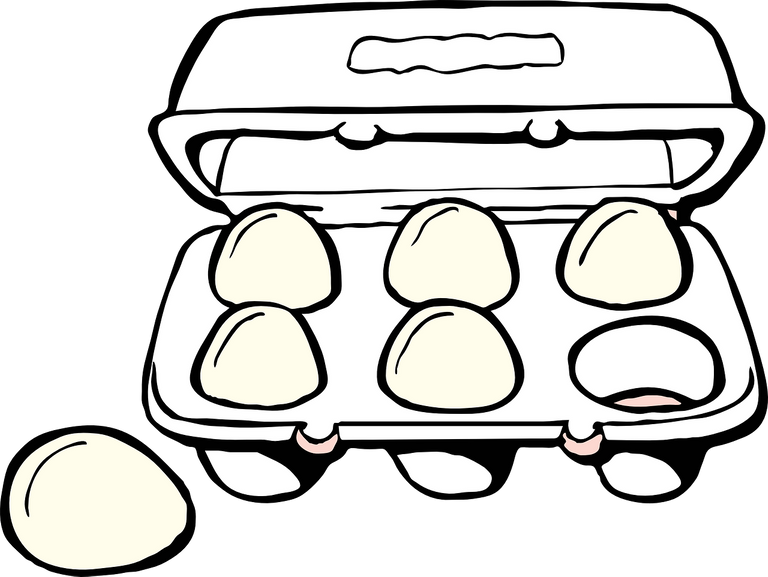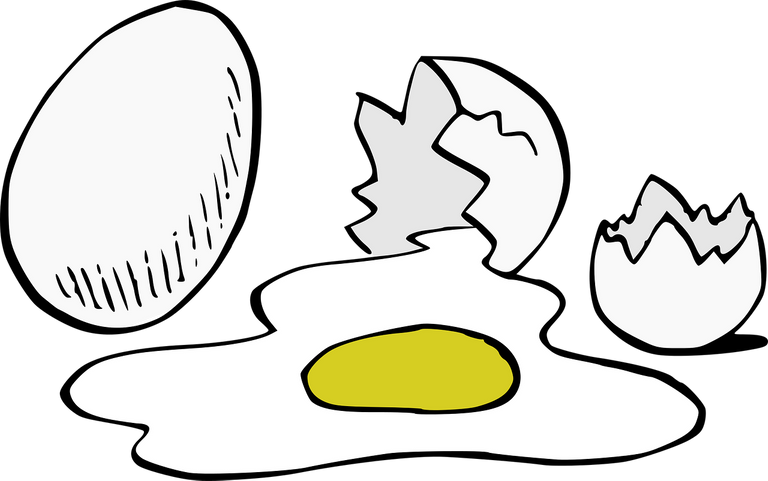Eggs
For the first time in this blog I will treat the subject of eggs in our diet.In this article I would refer exclusively to the most common chicken eggs, although the eggs of ducks, canes, and even quails also exist.You will discover in the rest of the article that the eggs have many advantages, many prejudices, with its share of disadvantages.It is for all of these nutritional characteristics that eggs are seen as the "holy grail" of the adepts of the Palaeolithic regime.
In this blog I will cover -
- Begin tomorrow to add eggs to your menus
- Better choose your eggs, and why not build a chicken coop
- Breaking down your prejudices about eggs and health
- Limit your consumption of industrial meat, unsavory
- One egg a day, why?
- The ease of preparation, the nutritional properties, the recognized health benefits are all points developed in the rest of the article.
I strongly recommend that you carefully read these points (more or less scientific-centric) but also the limits of consumption, the optimal farming conditions and the traps of the agro-food industry.
Eggs contain all essential amino acids, in the ideal proportions
Proteins are vital for the construction, reconstruction, repair or maintenance of all our cells. The egg is therefore the reference model in terms of protein quality because it has the 9 essential amino acids that our body can not synthesize, and they are all perfectly digested by the body. An index was invented to evaluate the quality of different protein sources. This index (PDCAAS) takes into account the digestibility of the proteins, and the composition in essential amino acids.
The egg has a score of 1 (maximum), wheat flour 0.41 or lentils with 0.52 (source)
As you know, the World Health Organization recommends eggs as a source of protein for children.
Here is the list of nine essential amino acids:
- histidine
- isoleucine
- leucine
- lysine
- methionine
- phenylalanine
- threonine
- tryptophan
- valine
 enature proteins, inactivate them, which makes them unnecessary for our organism. However, proteins in a cooked egg are particularly resistant to cooking.Nearly 94% of the proteins are still bio-available after cooking.
enature proteins, inactivate them, which makes them unnecessary for our organism. However, proteins in a cooked egg are particularly resistant to cooking.Nearly 94% of the proteins are still bio-available after cooking.
Eggs protect our eyes
The egg yolk is rich in carotenoids, including lutein and zeaxanthin. These two carotenoids present at 2000 micrograms and 1000 micrograms respectively have benefits for the health of our eyes (1). A study published in 2006 in the journal Investigative Ophthalmology & Visual Science has just demonstrated that these two carotenoids have protective roles against cataract and age-related macular degeneration (AMD). The risk of DLMA would be reduced by almost 80% and nearly 50% for cataract (2).
(1) Delcourt C: Plasma lutein and zeaxanthin and other carotenoids as modifiable risk factors for age-related maculopathy and cataract: the POLA Study. Invest Ophthalmol Vis Sci. 2006 Jun; 47 (6): 2329-35.
(2) Schlatterer J, Xanthophylls in commercial egg yolks: quantification and identification by HPLC and LC- (APCI) MS using a C30 phase. J Agric Food Chem. 2006 Mar 22; 54 (6): 2267-73.
They do NOT increase cardiovascular risk
One egg a day completely covers our cholesterol needs. It is for this reason that the egg is the scapegoat of doctors and nutritionists when talking about diseases and cardiovascular accidents. To understand the problem of the egg and cholesterol, two very simple points. First, diet brings only 30% of our cholesterol (exogenous contribution), whereas our body produces the remaining 70% (endogenous intake). On the other hand, two studies, one of which was published in the famous Journal of the American Medical Association, showed that daily consumption of one egg per day does not increase cardiovascular risk (3-4 ). On the other hand, people with diabetes see their risk increase, so they must remain vigilant.
(3) Willett WC. A prospective study of egg consumption and risk of cardiovascular disease in men and women. JAMA. 1999 Apr 21; 281 (15): 1387-94.
(4) Scharer M. Egg intake and cardiovascular risk. Ther Umsch. 2005 Sep; 62 (9): 611-3
ccounts for nearly 70% of the phospholipids, ie 2 g per 100 g of egg, is the precursor of acetylcholine. Acetylcholine is a chemical messenger present in the brain that serves as a support to memory (5). It should be noted that choline is involved in other processes, including cholesterol management.
(5) Zeisel SH, Concentrations of choline-containing compounds and betaine in common foods. J Nutr. 2003 May 133 (5): 1302-7
They protect against breast cancer
A study published in 1999 by the Harvard School of Public Health demonstrates a protective effect of carotenoids and vitamins A, C, E on the onset of breast cancers.
This study was performed on more than 80,000 women before menopause.
(6) Zhang S, Hunter DJ, Forman MR et al. Dietary carotenoids and vitamins A, C, and E and risk of breast cancer. J Natl Cancer Inst. 1999; 91: 547-556.
Zero Sugar!
This is not a scoop, the eggs are very rich in lipids, proteins (concentrations vary between yellow and white) and incredibly low in carbohydrates. A serving of 100 g of an egg to the dish is about 1 g of carbohydrates, or 2% of the recommended daily intake of carbohydrates. As much to say that eggs are the ideal candidates for diets low in carbohydrates, to create ketogenesis or to control its addiction to sugar.
Sources of many nutrients, good for you
Selenium, vitamin A, B2, B12, D, E, phosphorus, Zinc, pantothenic acid, or folate are all nutrients present in more or less quantity in the eggs. It is impossible to remind you of all the benefits of these nutrients, but the many antioxidants (selenium, vitamin A, E), metabolic stimulators (vitamin B2, B12, pantothenic acid), or cellular protectors (vitamin E, phosphorus) You convince the many benefits of integrating eggs into your diet.
Very fast to prepare
- How long does it take to prepare an egg for the dish?
- How much to make a poached egg?
- And how much for scrambled eggs?
As you can see, the egg preparation times are ridiculously low, and it is a powerful argument to integrate easily into the menus. To go further, some will speak to me (rightly) of the tartars or the famous "carbo pasta" where the egg is directly (with or without the yellow) put raw in the dish. The use and the biological properties are thus optimal.
Long shelf life of whole eggs
In the refrigerator, a whole egg (with its shell) can be stored for up to 5 weeks from the date of packing without significantly losing its nutritional qualities. Hard-boiled eggs (without shell) can be stored in the refrigerator for up to one week. You can also place your raw eggs in the freezer. Either the isolated white in ice cube trays or the whole egg mixed. To defrost, place them in the refrigerator and avoid the ambient temperature.
Fresh or not egg, very easy to know
- How do I know if my egg is still fresh?
There is one method that everyone knows here is the immersion of the egg. Except that the doubt persists every time ...
So, will it sink or float? Is it fresh or not?
- The old eggs have a larger pocket of air, as soon as they are found in the water they float.
- A flowing egg is therefore a sign of good freshness and probably of good quality.
Amazing and very strong preparation diversity
Eggs are the basis of many desserts:
- blown
- flans
- quiches
- pancakes etc.
They can also decorate dishes or be prepared in different ways:
- In salad
- Hard-boiled eggs
- In omelettes
- Marinated Hard-boiled Eggs
- Scrambled eggs
- Huevos Rancheros
- Florentine soup
- Provençal Omelette
- Crunchy bread
- frittata
- Egg in the hole


Eggs are a great health food! They also contain biotin.
Indeed it is
Nice post
Thanks for sharing
Upvoted & followed
Thank you very much sir @lordoftruth
You are welcome
Please support
Upvotes, Resteems
Followed you sir
Thanks for support
Have a great day
same to you sir
Sunday Ho Ya Monday, Rozz Khao Andey....
True Bhai @looftee. Janhit me jari.😂
Well that is a nice reminder about eggs bro. All i know is that they are good for protein and make a nice sandwich. Are you studying nutrition? You post alot of nice healthy stuff.
Well that's enough . Yes I am a runner so I know about nutrition. And I want to make people aware about the pros and cons of stuff
Very cool and kind of you.
Eggs are such a valuable source of protein! I eat my eggs almost 5 out of 7 days per week. Great post thank you for sharing !